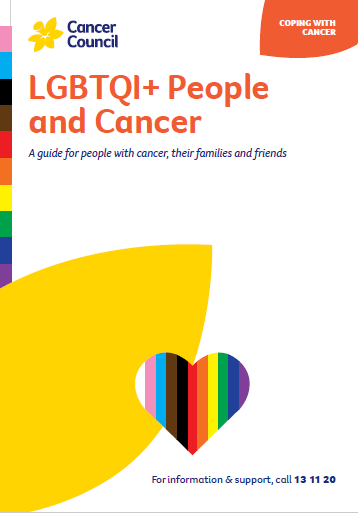- Home
- About Cancer
- LGBTQI+ People and Cancer
- Intersex people and cancer
Intersex people and cancer
We discuss some of the ways having an intersex variation might affect treatment for cancer. There are at least 40 known variations of sex characteristics and it is estimated that they occur in about 2% of births.
Common variations include complete androgen insensitivity syndrome, 46,XY complete gonadal dysgenesis (Swyer syndrome) and 47,XXY (Klinefelter syndrome).
Learn more about:
Cancer care as an intersex person
The cancer care team should offer you care and information that meets your needs, respects who you are, and supports you to make informed decisions about treatment. They should treat you as an individual and work with you in a way that respects your privacy and dignity.
Challenges for intersex people
As an intersex person, you may have some added challenges. For example:
- it may be harder to find cancer specialists with an understanding of any health issues you have related to your intersex variation
- clinical practice guidelines that set out recommended cancer treatment pathways may not cover your situation, which can make it harder for you to make informed decisions
- you may avoid cancer screening because of the lifelong impact of inappropriate treatment to manage cancer risk
- surgery for cancer may be a reminder of surgery imposed on you as a child, which may be distressing and traumatising
- you may feel vulnerable because of your experiences of harassment, violence, stigma, exclusion and discrimination (minority stress).
Partnering with your cancer care team
Working in partnership with your cancer specialists to make decisions about your treatment and ongoing care may help you deal with these challenges. Research shows that many health professionals lack confidence and knowledge in treating intersex people.
If you have a GP or other specialist looking after your ongoing medical care, they can provide your cancer specialists with any information that is relevant to your cancer care. This may include details about your intersex variation, the sex assigned to you at birth, your gender, your anatomy and any hormone therapy you take.
Communicating your medical history
If you don’t have a GP or other specialist you trust, think about what you want to say and how much you want to share with your cancer specialists. Take someone with you to your appointments to support you with this conversation.
To get the correct cancer diagnosis and treatment, your doctor needs to understand your medical history, which may be confronting.
Learn more about dealing with discrimination.
Getting support can help reduce feelings of distress. Talking to intersex-aware psychologists, counsellors, psychiatrists or other health professionals may be helpful. Learn ways to find support.
I do think an emphasis on intersex care is vital and long overdue in the health as we are so overlooked as a community.
ALEX (PANSEXUAL, NON-BINARY, INTERSEX, SKIN CANCER)
→ READ MORE: Diversity of experience
Podcast: Coping with a Cancer Diagnosis
Listen to more of our podcast for people affected by cancer
We thank the chief investigators: Prof Jane Ussher, Prof Janette Perz, Prof Martha Hickey, Prof Suzanne Chambers, Prof Gary Dowsett, Prof Ian Davis, Prof Katherine Boydell, Prof Kerry Robinson and Dr Chloe Parton. Partner investigators were Dr Fiona McDonald and A/Prof Antoinette Anazodo. Research Associates were Dr Rosalie Power, Dr Kimberley Allison and Dr Alexandra J. Hawkey.
We thank the reviewers: Prof Jane Ussher, Chair, Women’s Heath Psychology and Chief Investigator, Out with Cancer study, Western Sydney University, NSW; ACON; Dr Kimberley Allison, Out with Cancer study, Western Sydney University, NSW; Dr Katherine Allsopp, Supportive and Palliative Care Specialist, Westmead Hospital, NSW; A/Prof Antoinette Anazodo OAM, Paediatric and Adolescent Oncologist, Sydney Children’s Hospital, NSW; Megan Bathgate, Consumer; Gregory Bock, Clinical Nurse Consultant–Oncology Coordinator, Urology Cancer Nurse Coordination Service, WA Cancer & Palliative Care Network, WA; Morgan Carpenter, Executive Director, Intersex Human RIghts Australia (formerly OII Australia); Prof Lorraine Chantrill, Medical Co-Director Cancer Services, Illawarra Shoalhaven Local Health District, NSW; A/Prof Ada Cheung, Endocrinologist, Head, Trans Health Research Group, Department of Medicine (Austin Health), The University of Melbourne, VIC; Bonney Corbin, Australian Women’s Health Network; Cristyn Davies, Research Fellow, Specialty of Child and Adolescent Health, Faculty of Medicine and Health, The University of Sydney and Children’s Hospital Westmead Clinical School, NSW; Prof Ian Davis, Professor of Medicine, Monash University and Eastern Health, Medical Oncologist, Eastern Health, Chair, ANZUP Cancer Trials Group, VIC; Rebecca Dominguez, President, Bisexual Alliance Victoria; Liz Duck-Chong, Projects Coordinator, TransHub and Trans Health Equity, ACON, NSW; Lauren Giordano, 13 11 20 Consultant, Cancer Council NSW; Hall & Wilcox (law firm); Natalie Halse, BCNA Consumer Representative; Jem Hensley, Consumer; Prof Martha Hickey, Professor of Obstetrics and Gynaecology, The University of Melbourne, and Director of the Gynaecology Research Centre, The Women’s Hospital, VIC; Kim Hobbs, Clinical Specialist Social Worker – Gynaecological Cancer, Westmead Hospital, NSW; Dr Laura Kirsten, Principal Clinical Psychologist, Nepean Cancer Care Centre, NSW; Amber Loomis, Policy and Research Coordinator, LGBTIQ+ Health Australia; Julie McCrossin and Melissa Gibson, Consumers; Dr Fiona McDonald, Research Manager, Canteen, NSW; Dr Gary Morrison, Shine a Light (LGBTQIA+ Cancer Support Group); Penelope Murphy, Cancer Council NSW Liaison, Prince of Wales Hospital, NSW; Dr Rosalie Power, Out with Cancer study, Western Sydney University, NSW; Jan Priaulx, 13 11 20 Lead Sexual Health Nurse Health, VIC; Cheryl Waller and Rhonda Beach, Consumers.
View the Cancer Council NSW editorial policy.
View all publications or call 13 11 20 for free printed copies.
